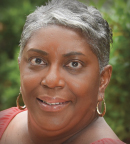Sometimes there just is no escaping cancer. I thought I had done everything right. I was diligent about adhering to my annual physical exams, including mammograms, and routinely performed breast self-exams to spot any early changes in my breasts. Still, in the summer of 2015, I was diagnosed with hormone receptor–positive, HER2-negative de novo metastatic breast cancer. A mammogram had detected a mass in my right breast, and additional imaging scans found that the cancer had spread to my bones. After that, everything went off the rails.
At the time, I was a hospice nurse and had helped hundreds of patients transition to a peaceful death. But now, facing my own mortality, I couldn’t summon that same compassion for myself. I was scared. I continued to work throughout my grueling treatment, which included combinations of doxorubicin, cyclophosphamide, and paclitaxel, followed by a contralateral prophylactic mastectomy and radiation therapy.

“My faith, family, friends, and medical team are positive forces in my life. They create balance in my life and keep me moving forward.”— Stephanie Walker
Tweet this quote
Despite the hair loss, nausea, vomiting, and fatigue from the treatment, I continued to make home hospice visits to care for my patients and found comfort in their courage. In 2016, I was ecstatic to learn that my treatment was successful in halting the spread of the cancer and that there was no evidence of disease in my body. I receive monthly injections of fulvestrant, and my health status has remained unchanged. But the emotional and physical toll of cancer continues to ravage my body and mind.
Coping With the Physical, Emotional, and Financial Effects of Cancer
In 2018, I was diagnosed with a blood clot in my left lung; I had a transient ischemic attack and could no longer work. I loved being a nurse, and not being able to care for patients has been harder than coping with my own cancer diagnosis.
I’m not ashamed to admit that the past few years have been difficult. As the primary financial provider in our family, the loss of income has forced my husband and I to move to another state and budget our money carefully. Our precarious financial situation; the constant pain in my back, hip, and legs from the cancer and its treatment; and the fear that the cancer will progress, coupled with the added isolation brought on by the COVID-19 pandemic, have caused depression and anxiety so severe I momentarily considered suicide.
I am receiving psychosocial counseling from a cancer therapist. Although I continue to see my oncologist and other members of my medical team, who are monitoring my health, no one is coordinating my care, and I worry I am falling through the cracks of the medical system. The experience has led me to become a patient advocate to help others going through cancer, especially women of color diagnosed with metastatic breast cancer, so they can find the emotional and financial support they need. I also am volunteering my time to care for patients on hospice care in my community. The work is rewarding and temporarily removes me from my own physical, emotional, and financial hardships.
Finding a Renewed Life Purpose
I know I’m lucky. I have surpassed the usual survival prognosis for my type of advanced breast cancer and am trying not to waste any of this precious time, but I’m not always successful. Some days are extremely tough.
My faith, family, friends, and medical team are positive forces in my life. They create balance in my life and keep me moving forward. My main goal now is to do good in the world. Through my experience as a cancer survivor and patient advocate, I hope I’m able to bring comfort to others diagnosed with cancer. I’m finding that helping others is giving me back my life purpose, and a life fulfilled, and I’m grateful.
Ms. Walker lives in Tarboro, North Carolina.
Editor’s Note: Columns in the Patient’s Corner are based solely on information The ASCO Post received from patients and should be considered anecdotal.

